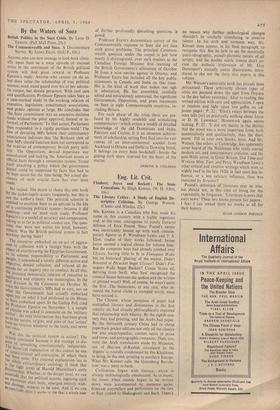By the Waters of Suez
ANYONE who can now manage to look back clinic- ally upon Suez as a mere episode of unusual stress in the continuum of the British political system will find great reward in Professor Epstein's study. Anyone who cannot yet do so, but does value the scholarship of true political science, must stand guard over his or her adrena- lin output, but should persevere. With cool care and qualification, Professor Epstein takes Suez as a case-method study in the working relation of executive, legislature, constituency associations, and public opinion at large. He concludes that `the Suez commitment was an executive decision made without the prior approval, formal or in- formal, of Parliament.' To that action, Parliament then responded 'in a rigidly partisan mold.' The fate of deviating MPs before their constituency associations indicates that 'the Burkean view of how MPs should function does not correspond to the realities of contemporary British party poli- tics.' The Opposition, denied bipartisan war consultation and lacking the American access to official facts through a committee system, 'found itself attacking a policy which the government hinted could be supported by facts that had to be kept secret for the time being. No actual dis- closure of such crucial facts has ever been made.'
No indeed. The desire to shake this able book by the jacket-lapels occurs frequently, but this is not the author's fault. The political scientist is entitled to examine Suez as an episode in the life of a continuing political system—because it did continue—and we need such study. Professor Epstein's is a model of accuracy and compression, taking us as far as political science can. The ques- tions that were not within his brief, however, remain. Was the British political system in fact working during Suez?
The executive embarked on an act of aggres- sion in collusion with a foreign State with the object of overthrowing the Egyptian Government. 111 its solemn responsibility to Parliament and People, it announced a totally different action and objective, denied collusion; and refused all de- ibands for an inquiry into its conduct. In all this, ,the assumed democratic relation of executive to legislature and citizenry was meaningless. In the first division in the Commons on October 30, even the Government's MPs had to vote, not on _what the Government had actually embarked to but on what it had professed to the House by have embarked upon. In the Gallup Poll cited .O3: Professor Epstein on November 1, a sample of Citizens was asked to comment on the 'military action'; the only information they had been given as to
the nature, origins, and aims of that 'action' bore no relation whatever to the truth, and never has since.
Was this the political system in action? The dis- Pose continued because it did manage to dis- 43..% 0. f something constitutionally indigestible. c(131istorical explanation of this cannot be one nstitutional self-correction, of which there " been none. The external explanation lies in ,the whole extraordinary sociology (I think that 4. the right term) of Harold Macmillan's early eoetniership. Whether, at the deeper level, we can
nclude that the political system, ingesting such ail enormous alien body, emerged entirely with- out d
k,, _ damage, remains to be seen. And it we can uon dude, then it seems to me that a whole host
of further profoundly disturbing questions is posed.
Professor Eayrs's documentary survey of the Commonwealth, response to Suez did not face such grave problems. The principal Common- wealth question under the carpet is just how nearly it disintegrated, over such matters as the Canadian Foreign Minister first learning of the British Government's ultimatum of October 30 from a wire service agency in Ottawa; and Professor Eayrs has included all the key public statements in Canada and India on that issue. His is the kind of work that makes one sigh in admiration. He has assembled, carefully edited and meticulously annotated, the significant Government, Opposition, and press statements on Suez in eight Commonwealth countries, in- cluding Britain.
For each phase of the crisis these are pre- faced by his highly readable and stimulating commentaries—which evince a wealth of detailed knowledge of the old Dominions and India, Pakistan and Ceylon. It is an immense achieve- ment of scholarship, setting Port Said into the vast canvas of an inter-continental scandal from Auckland to Ottawa and Delhi to Downing Street. It belongs on every Suez bookshelf—beside the gaping dark space reserved for the heart of the matter.
ERSKINE B. CHILDERS


































 Previous page
Previous page